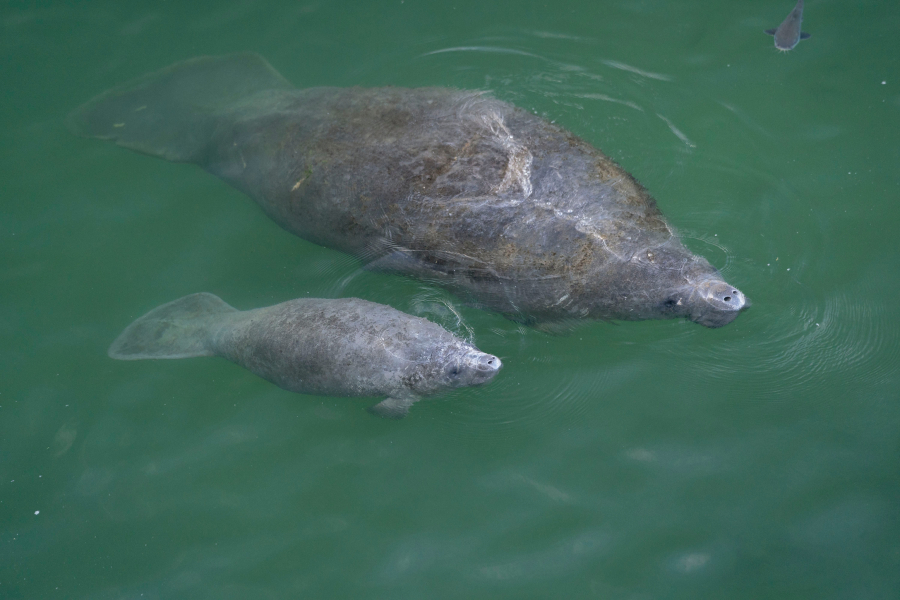MIAMI — In a year when a third of manatee fatalities in Florida were not investigated because COVID-19 restrictions limited necropsies and boat strikes once again topped deaths caused by humans, one indicator stood out: manatees killed by floodgates and locks.
Of a total of 619 deaths in Florida’s waterways last year, 10 manatees were crushed or drowned in flood-control structures, according to the Fish and Wildlife Conservation Commission’s preliminary mortality report. It may seem like a small number compared with the 90 animals that died after being hit by boats. But it’s twice the number of manatees killed by floodgates last year, and more than double the average of four deaths over the past five years.
Last year was exceptionally wet and floodgates worked intensely to keep water from inundating cities and fields. But manatees shouldn’t die in flood-control structures, at least in theory. Since the 1990s, Florida’s vast network of gates that regulate water flows have been equipped with sensors that are activated if manatees are near. This technology stops gates from closing, allowing the animals to swim through.
“These are all preventable deaths,” said Sarah Gledhill from the Center for Biological Diversity. “And in general, we should not think that it’s normal for hundreds of manatees to die in Florida every year.”
Though Florida’s manatee population has increased to an estimated 7,000 to 10,000 over the past few decades largely as a result of slow-speed zones and boater education campaigns, deaths climbed in 2020 from 592 in the previous year, the FWC’s preliminary count showed. Last year wasn’t as bad as 2018, when a toxic red tide killed scores of marine animals including dozens of manatees around the Gulf Coast. More than 800 manatees died that year, and about 200 deaths were attributed to the yearlong red tide event.
But 2020 was a very wet year, with record-breaking rainfall drenching South Florida right at the beginning of the season in May and then again through October, before Tropical Storm Eta slammed the region in November. The extreme conditions left water managers scrambling to find places to move water by activating flood-control systems much more frequently, which may have led to an increase in incidents, said Patrick Rose, executive director of the Save the Manatee Club.
“When there is a lot of rain the chances for problems increase even in areas where manatee safety measures have been taken,” Rose said. “It also causes manatees to venture into areas where they have not traditionally visited and become entrapped in structures not yet made safe for them, which is what happened.”
With sea-level rise and more extreme weather events forecast to worsen high water and flooding, this will be a growing threat to manatees, he added.
FWC said in a statement that water levels affected the annual number of structure-related manatee deaths because water-control structures operate more frequently, increasing the risk to manatees and also providing the animals access to areas and structures they are not normally able to reach.
“The FWC is continuing to work with the Water Control Structure Working Group to try and determine what caused these manatee deaths and discuss ways to reduce future deaths,” according to the statement.
The South Florida Water Management District, which manages these structures, said it conducts preventive maintenance and inspections on the structures on a quarterly basis, and that manatee sensors “are successful 99 percent of the time.”
In one recent case that’s still under investigation, a manatee was found decapitated near a salinity barrier in Miami’s Little River. On Dec. 15, WPLG reported that wildlife biologist Natalie Mahomar spotted a carcass while birdwatching with a friend near the structure.
“The body was on one side and the head was on the other side of the gate,” Mahomar told WPLG.
Miami Waterkeeper’s Rachel Silverstein speculated that the gates may have closed on the sea cow as it was attempting to swim across the large S27 structure, which serves a dual function: flood control and prevention of saltwater intrusion.
The Water Management District said the manatee protection feature was apparently functioning properly but that it’s working with the FWC to determine the cause of death. An investigation report should be concluded soon, said spokesman Randy Smith.
Though wildlife managers cut down on necropsies to ensure social distancing and protect staff from COVID-19 exposure, FWC didn’t slow efforts to rescue the sea cows when they were reported to be in distress. Many were rescued: 120 last year compared with 96 in 2019, according to marine mammal rescue data. Most rescues were involved in boat collisions.
The 2020 manatee mortality report raised some old concerns about threats to the gentle marine mammal that serves as an indicator of the health of Florida’s waters. While deaths caused by watercraft have dropped compared with previous decades, they are still high and may have been significantly undercounted last year due to COVID-related disruptions.
Manatee awareness among boaters must improve, especially in fast-growing places like South Florida, where newcomers from out of state and abroad are constantly joining the boating community but often don’t have the experience navigating local waters, Rose said.



